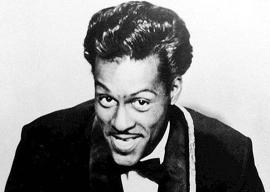
April 11, 2017

Chuck Berry
Source: Wikimedia Commons
Berry got his start playing with pianist Johnnie Johnson, who “sued him in 2000 over songwriting credits and royalties to a number of hit songs.” Hilariously:
[Keith] Richards had also been Johnson’s most vocal and ardent supporter and argued for Johnson’s deserving credit, telling “Rolling Stone” magazine, “In a way, I”m a bit responsible. I said to Johnnie, “These songs should really say Berry/Johnson.” It was obvious after talking to him and watching him play. But Chuck being Chuck, you”d be lucky to get a quarter. Or you”d end up paying him.”
While popular-music scholarship now presents a more nuanced version of rock history, it remains an article of middlebrow faith that “whites stole rock & roll from blacks.” Whereas it would be just as true to say that blacks stole rock & roll from other blacks:
Little Richard borrowed heavily from Esquerita, right down (or, more accurately, up) to the hairdo; his “open letter to the music industry” to the contrary, Chubby Checker flat-out ripped off Hank Ballard; and after Fats Domino came to town, pianist and singer “Smiley“ Lewis earned another nickname: “the unluckiest man in New Orleans.”
But the myth persists, hence the surfeit of (I still say justifiable) “Back to the Future is racist!” essays easily found online. And anyone who thinks white liberal virtue-signaling is a 21st-century cyberphenomenon should dust off their copy of Slouching Towards Bethlehem. In Joan Didion’s “New Journalism” traipse through 1967 San Francisco, we meet a gaggle of white hippie “street theater” performers, in blackface, wearing signs on their backs reading, among other things, “WHO STOLE CHUCK BERRY’s MUSIC?”
Incredibly, they begin jabbing a “Negro” passerby with nightsticks:
“I”m beginning to get annoyed here,” the Negro says. “I”m gonna get mad.”
By now there are several Negroes around, reading the signs and watching.
“Just beginning to get annoyed, are you?” one of the Mime Troupers says. “Don”t you think it’s about time?”
“Nobody stole Chuck Berry’s music, man,” says another Negro who has been studying the signs. “Chuck Berry’s music belongs to everybody.”
“Yeh?” a girl in blackface says. “Everybody who?”
“Why,” he says, confused. “Everybody. In America.”
“In America,” the blackface girl shrieks. “Listen to him talk about America.”
“Listen,” he says helplessly. “Listen here.”
“What”d America ever do for you?” the girl in blackface jeers. “White kids here, they can sit in the Park all summer long, listen to the music they stole, because their bigshot parents keep sending them money. Who ever sends you money?”
“Listen,” the Negro says, his voice rising. “You”re gonna start something here, this isn”t right””
“You tell us what’s right, black boy,” the girl says.
Like anyone who writes from the right, I get called a “white supremacist” a lot. Which is a scream, because half the time, I think we”re just goddamn embarrassing.